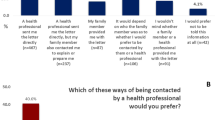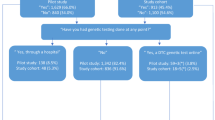Abstract
Genetic tests have traditionally been offered by health professionals. However, genomic tests have been available direct to the consumer for the last decade, increasingly via the Internet. The aim of this systematic review was to ascertain the evidence concerning use of direct-to-consumer genomic testing from the consumer perspective. Primary research was identified using the search terms ‘direct-to-consumer’ and ‘genomic or genetic’ in six bibliographic databases and citation searching of findings. In all, 17 papers were reviewed: 3 qualitative and 14 quantitative. Findings indicate a low level of awareness of direct-to-consumer genomic testing and, because of the hypothetical nature of many studies, little evidence from users of such tests. Although potential users appear to be interested in information about their risks of developing common diseases, concerns were expressed about privacy of genetic risk information and the reliability of genomic tests. Consumers were anxious about the nature of the results. There appeared to be a preference to access genomic tests via a health professional, or to discuss the results and obtain advice from a health professional. Authors of only two papers recruited participants who had used direct-to-consumer tests and samples from the large quantitative studies were not representative of the population. These factors limit the value of the available evidence. However, we conclude that there is public interest in direct-to-consumer genomic tests, and that this is likely to result in an increased workload for a range of health professionals. We also consider that there are educational implications for both consumers and health professionals.
Similar content being viewed by others
Log in or create a free account to read this content
Gain free access to this article, as well as selected content from this journal and more on nature.com
or
References
Burton H : Genetics and Mainstream Medicine. Cambridge, UK: Public Health Genetics Foundation, 2011.
McBride CM, Wade C, Kaphingst KA : Consumers’ views of direct-to-consumer genetic information. Annu Rev Genomics Hum Genet 2010; 11: 427–446.
National Human Genome Research Institute: A Catalog of Published Genome-Wide Association Studies. National Human Genome Research Institute, 2011 (Online). Available at http://www.genome.gov/26525384 (accessed 8 September 2011).
McGuire AL, Burke W : An unwelcome side effect of direct-to-consumer personal genome testing. Raiding the medical commons. J Am Med Assoc 2008; 300: 2669–2671.
Ng PC, Murray SS, Levy S, Venter JC : An agenda for personalized medicine. Nature 2009; 461: 724–726.
Godard B, Kaariainen H, Kristoffersson U, Tranebjaerg L, Coviello D, Ayme S : Provision of genetic services in Europe: current practices and issues. Eur J Hum Genet 2003; 11 (Suppl 2): S13–S48.
US Food and Drug Administration: Letter to Pathway Genomics Corporation Concerning the Pathway Genomics Genetic Health Report 2010 (Online). Available at http://www.fda.gov/MedicalDevices/ResourcesforYou/Industry/ucm211866.htm (accessed 21 July 2011).
Lewis C, Kent A, Skirton H, Coviello D : EuroGentest patient information leaflets: a free resource available in over 20 languages. Eur J Hum Genet 2009; 17: 732–732.
Messner DA : Informed choice in direct-to-consumer genetic testing for Alzheimer and other diseases: lessons from two cases. New Genet Soc 2011; 30: 59–72.
van El CG, Cornel MC : Genetic testing and common disorders in a public health framework. Eur J Hum Genet 2011; 19: 377–381.
Borry P : Statement of the ESHG on direct-to-consumer genetic testing for health-related purposes. Eur J Hum Genet 2010; 18: 1271–1273.
Victor L : Systematic reviewing. Social Res Update 2008.
Centre for Reviews and Dissemination: Systematic Reviews. York: CRD, University of York, 2008.
Kmet LM, Lee RC, Cook LS : Standard Quality Assessment Criteria for Evaluating Primary Research Papers from a Variety of Fields. Alberta Heritage Foundation for Medical Research, 2004 (Online), Edmonton, Canada. Available at http://www.ihe.ca/documents/HTA-FR13.pdf (accessed 1 February 2012).
Braun V, Clarke V : Using thematic analysis in psychology. Qualitative Res Psychol 2006; 3: 77–101.
Bloss CS, Ornowski L, Silver E et al: Consumer perceptions of direct-to-consumer personalized genomic risk assessments. Genet Med 2010; 12: 556–566.
Bloss CS, Schork NJ, Topol EJ : Effect of direct-to-consumer genomewide profiling to assess disease risk. N Engl J Med 2011; 364: 524–534.
Gollust SE, Gordon ES, Zayac C et al: Motivations and perceptions of early adopters of personalized genomics: perspectives from research participants. Public Health Genomics 2011.
Kaphingst KA, McBride CM, Wade C, Alford SH, Brody LC, Baxevanis AD : Consumers’ use of web-based information and their decisions about multiplex genetic susceptibility testing. J Med Internet Res 2010; 12: e41.
McBride CM, Hensley-Alford S, Reid RJ, Larson EB, Baxevanis AD, Brody LC : Characteristics of users of online personalized genomic risk assessments: implications for physician-patient interactions. Genet Med 2009; 11: 582–587.
O’Neill SC, White DB, Sanderson SC et al: The feasibility of online genetic testing for lung cancer susceptibility: uptake of a web-based protocol and decision outcomes. Genet Med 2008; 10: 121–130.
Cherkas LF, Harris JM, Levinson E, Spector TD, Prainsack B : A survey of UK public interest in internet-based personal genome testing. PLoS ONE 2010; 5: E13473.
Gray SW, O’Grady C, Karp L et al: Risk information exposure and direct-to-consumer genetic testing for BRCA mutations among women with a personal or family history of breast or ovarian cancer. Cancer Epidemiol Biomark Prevent 2009; 18: 1303–1311.
McGuire AL, Diaz CM, Wang T, Hilsenbeck SG : Social networkers’ attitudes toward direct-to-consumer personal genome testing. Am J Bioethics 2009; 9: 3–10.
Perez GK, Cruess DG, Cruess S et al: Attitudes toward direct-to-consumer advertisements and online genetic testing among high-risk women participating in a hereditary cancer clinic. J Health Commun 2011; 16: 607–628.
Wilde A, Meiser B, Mitchell PB, Hadzi-Pavlovic D, Schofield PR : Community interest in predictive genetic testing for susceptibility to major depressive disorder in a large national sample. Psychol Med 2011; 41: 1605–1614.
Wilde A, Meiser B, Mitchell PB, Schofield PR : Public interest in predictive genetic testing, including direct-to-consumer testing, for susceptibility to major depression: preliminary findings. Eur J Hum Genet 2010; 18: 47–51.
McGowan ML, Fishman JR, Lambrix MA : Personal genomics and individual identities: motivations and moral imperatives of early users. New Genet Soc 2010; 29: 261–290.
Su Y, Howard HC, Borry P : Users’ motivations to purchase direct-to-consumer genome-wide testing: an exploratory study of personal stories. J Commun Genet 2011; 2: 135–146.
Ortiz AP, Lopez M, Flores LT et al: Awareness of direct-to-consumer genetic tests and use of genetic tests among Puerto Rican adults, 2009. Prevent Chronic Disease 2011; 8: A110.
Leighton JW, Valverde K, Bernhardt B : The general public's understanding and perception of direct-to-consumer genetic test results. Public Health Genomics 2012; 15: 11–21.
Sweeny K, Legg AM : Predictors of interest in direct-to-consumer genetic testing. Psychol Health 2011; 26: 1259–1272.
Maher B : Nature readers flirt with personal genomics. Nature 2011; 478: 19.
Sanderson SC, O’Neill SC, Bastian L, Bepler G, McBride CM : What can interest tell us about uptake of genetic testing? intention and behavior amongst smokers related to patients with lung cancer. Public Health Genomics 2010; 13: 116–124.
Harper PS : Ten years of presymptomatic testing for Huntington's disease: the experience of the UK Huntington's Disease Prediction Consortium. J Med Genet 2000; 37: 567–571.
Stretcher V, Rosenstock IM : The health belief model; in Glanz K, Lewis FM, Rimer BK (eds): Health Behavior and Health Education: Theory, Research and Practice. San Francisco: Jossey-Bass, 1997.
Vashlishan Murray AB, Carson MJ, Morris CA, Beckwick J : Illusions of scientific legitimacy: misrepresented science in the direct-to-consumer genetic-testing marketplace. Trends Genet 2010; 26: 459–461.
23andMe. 2011, (Online). Available at https://www.23andme.com (accessed 22 September 2011).
Hesse BW, Nelson DE, Kreps GL et al: The impact of the internet and its implications for health care providers: findings from the first Health Information National Trends Survey. Arch Intern Med 2005; 165: 2618–2624.
Draper J : Whose welfare in the labour room? A discussion of the increasing trend of fathers’ birth attendance. Midwifery 1997; 13: 132–138.
Acknowledgements
This study was undertaken as part of the work of Unit 2, Work Package 7 of the EuroGentest2 Coordination Action 2011 project. The project is funded by the European Commission, EU Contract no.: HEALTH-F4-2010-261469. We thank Professor Helena Kaariainen for her helpful comments on the text.
Author information
Authors and Affiliations
Corresponding author
Ethics declarations
Competing interests
The authors declare no conflict of interest.
Additional information
Supplementary Information accompanies the paper on European Journal of Human Genetics website
Supplementary information
Rights and permissions
About this article
Cite this article
Goldsmith, L., Jackson, L., O'Connor, A. et al. Direct-to-consumer genomic testing: systematic review of the literature on user perspectives. Eur J Hum Genet 20, 811–816 (2012). https://doi.org/10.1038/ejhg.2012.18
Received:
Revised:
Accepted:
Published:
Issue date:
DOI: https://doi.org/10.1038/ejhg.2012.18
Keywords
This article is cited by
-
Considerations for developing regulations for direct-to-consumer genetic testing: a scoping review using the 3-I framework
Journal of Community Genetics (2022)
-
Opportunities and challenges of integrating genetics education about human diversity into public health nurses’ responsibilities in Japan
BMC Nursing (2019)
-
Australians’ views and experience of personal genomic testing: survey findings from the Genioz study
European Journal of Human Genetics (2019)
-
“I would rather have it done by a doctor”—laypeople’s perceptions of direct-to-consumer genetic testing (DTC GT) and its ethical implications
Medicine, Health Care and Philosophy (2019)
-
Stages of behavioural change after direct-to-consumer disease risk profiling: study protocol of two integrated controlled pragmatic trials
Trials (2018)



